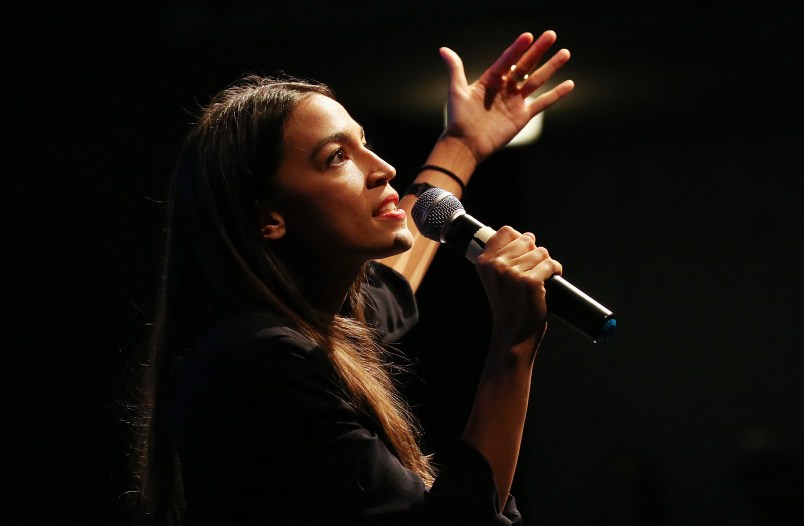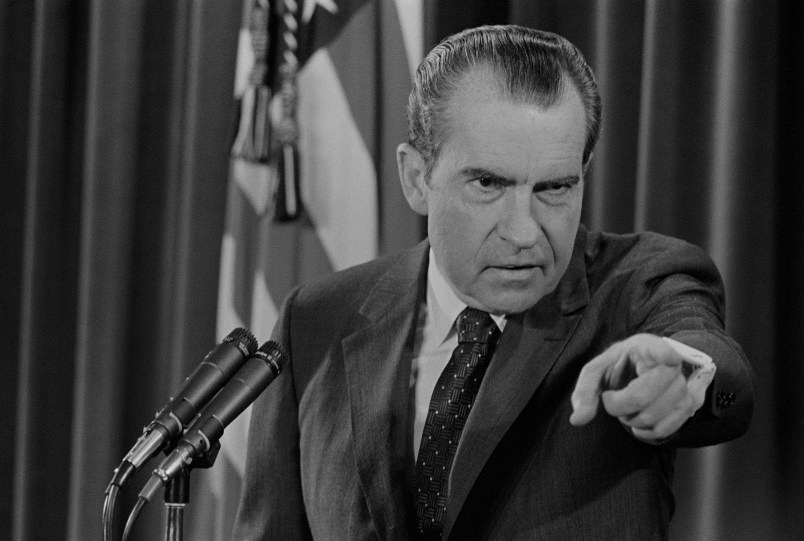This article is part of TPM Cafe, TPM’s home for opinion and news analysis.
Speaking in Colorado on Thursday, President Trump went after a favorite target: wind turbines.
“They want to use wind,” he complained. “Wind blow, wind please, please keep the birds away from those windmills, please.”
“You look at Palm Springs, California. Take a look. Palm Springs,” he continued. “They’re all over the place. They’re closed, they’re rotting, they look like hell,” Trump said.
When President Trump talks about climate change — beyond dismissing the problem outright — it often looks like this. He regularly blames windmills for cancer and claims that television will not work on calm or cloudy days.
Such absurdities are possible because comprehensive climate action still frightens many. The Democratic candidate that addressed it most clearly (Inslee) is gone and some in the moderate lane spend little time addressing it. Pundits fret over how to pay for strong action and many fear job or investment losses.
Democratic candidates are these days identified as radicals often in relation to three policies: 1) taxes on wealth or the wealthy, 2) Medicare for All, or 3) a Green New Deal. These assertions do not make much sense. Taxes on wealthy Americans today are proportionately lower than on middle class wage earners. Universal health care exists in all prosperous democracies except America. That said, my focus here is primarily on the Green New Deal.
One underlying reason the “radical” label sometimes sticks is, of course, asymmetric political polarization. Republican politics has moved well to the right, while Democrats as a whole have not moved significantly to the left. This asymmetry is so comprehensive (and conservative media so strong) that reasonable policy advocacy can be branded negatively. Amazingly, denying that climate change requires us to alter our behavior — or just ignoring it outright — are not considered radical.
The Green New Deal — as proposed in a 2019 bill introduced by Rep. Alexandria Ocasio-Cortez (D-NY) and Sen. Ed Markey (D-MA) — offers action on renewable energy, infrastructure, transportation and agriculture and largely eliminating carbon emissions by 2050. The bill foresees cooperation with farmers and the creation of more “good, union jobs” than would be lost. It also includes job and retraining guarantees for those with fossil energy jobs at risk.
Democrats up and down the ticket — and Republicans! — would do well to get behind some variant of this approach to clearly distinguish themselves sharply from Trump’s inability to even acknowledge the problem.
And legislators need not be concerned with the claims that the Green New Deal is a radical overhaul of the economy that Americans oppose: those claims don’t make any sense.
The need to reduce carbon emissions has been widely accepted by science and most nations for decades. Given that, what makes the idea so radical? In addition, most major American corporations and cities have already invested heavily in reducing emissions. And, reductions can be achieved while economic growth continues. Yes, some environmentalists advocate slower growth, but most versions of a Green New Deal do not.
While climate action does challenge fossil energy companies, it need not challenge America’s economic system as a whole. Nor will it necessarily challenge existing income or wealth distribution. Indeed a Green New Deal, as generally articulated, seeks restoration of pre-1980 wealth distribution, and can harness some of the populist outrage that has buoyed left-leaning Democrats as well as, ironically, Trump.
Important politically within the U.S. are the economic benefits of climate action to the relative advantage of rural, Southern and other Republican regions. Texas and the Midwest are windy and Florida is the Sunshine State for a reason. Likewise, Arizona, Colorado and Nevada — all purple states — are well-suited for renewable energy. Democratic candidates can sell strong climate action precisely where they need to grow their appeal.
Additionally, a Green New Deal would benefit construction and industrial workers as well as farmers (think solar on outbuildings, wind turbines on hilltops, soil as a carbon sink and climate friendly tilling practices). Democrats should repeatedly tell Republican voters that hostility to climate action is costing them money and mention frequently that fossil fuels in America even now employ fewer people than clean energy. What fossil energy corporations do, according to the Center for Responsive Politics, is invest 13.7 times what clean energy does on political influence.
Nor does climate action threaten most firms. Even oil companies could gradually transition to become energy companies. Capitalism, business tells us, is all about adaptation. They are not wrong. Entrepreneurship can speed a transition to a low carbon economy. It is contributing already in large ways and small. So are shifting consumer choices like dietary habits and transportation choices.
A Green New Deal also can strengthen local government. Zoning and construction standards are crucial to reducing carbon emissions. Municipalities and states also bear responsibility for transit, cycling and walking routes. Decentralized decision-making was once a Republican mantra. Democrats could emphasize that climate action empowers local decision-making.
Democrats should make clear that many of the social policies they advocate go hand-in-hand with climate action. Universal, portable, health insurance enables career shifts, business start-ups and long apprenticeships. As important, reducing student debt frees ambitious young people to undertake or join start-ups. Small entrepreneurs in local, organic food, renewable energy and energy efficiency are crucial to building a low carbon economy. Similarly, higher wages via stronger unions or minimum wage increases would help existing households lower their carbon emissions. Selling climate action and social policies together reaches out to a broader political audience. This is crucial to avoiding future backsliding and to getting people engaged in the transition process as consumers, employees and investors (in addition to as political actors).
Climate action and a Green New Deal are especially important to mobilizing younger voters and broader support for climate action. That broader support can be built by making more visible, indeed celebrating, the changes people and firms have already made and those that have made them. Candidates can identify living examples of low carbon choices and opportunities in their districts and the local businesses those choices create and support.
It is important to recognize that creating a low carbon economy will take 30–50 years — a long time period, perhaps, for “radical” change, but an unavoidable one. Transition is necessarily slow because it requires new infrastructure and it requires re-learning how to do some basic things like mass air travel and metal smelting. Many existing carbon-emitting devices and installations are still new. Doing things in new ways, however, will provide a large boost to those nations or firms that succeed. America at the moment is inclined toward looking backwards.
This already emerging transition, made visible, grows its own political constituency. People who install solar panels are not going to support endless fossil fuel subsidies. Organic farmers will not support deregulating hazardous pesticides. The notion that a Green New Deal is radical will fade quickly when people see neighbors installing solar panels or watch them sprout over local parking lots or on church roofs. The people and enterprises of a low carbon future do not look very radical up close.
Robert Paehlke is a Professor Emeritus at Trent University. His books include: Environmentalism and the Future of Progressive Politics (Yale, 1989), Democracy’s Dilemma (MIT, 2003) and Hegemony and Global Citizenship (Palgrave Macmillan, 2014).










Texas, yes Texas, leads in wind energy production. The farmers there oppose the government telling them what they must do, but will do the right thing for the money they earn.
We will get a green new deal eventually, but it may be too late if we don’t act now.
The green new deal covers a lot more than climate change. I don’t know why free college tuition is included, for example.
Automation and AI are taking away jobs. I don’t know the remedy, but this issue seems distinct from climate change. There are other quibbles. Many people believe that nuclear power is essential in the short run. Sanders is against nuclear power.
I’m glad to see this discussion of the insanely important need to rapidly evolve our energy production landscape and the production of Co2. The time to switch to alternative systems was 50 years ago. Now, it’s likely too late to prevent catastrophic change. This planet has survived for a hundred million years, and has developed a very healthy balance of systems within its atmosphere that allowed for our current diversity of life to develop. 200 years ago, we came along and fundamentally ignored and changed that balance. The earth itself is resilient, but not if we insist on tipping the balance toward doom.
Ainsley Earhardt is correct, it’s terrible we can’t have hamburgers anymore because the cows must be kept alive to supply methane to fuel our airplanes.
Two consecutive generations need to forgo procreation. That’ll fix most of our problems.
NOT. AT. ALL. SNARK.